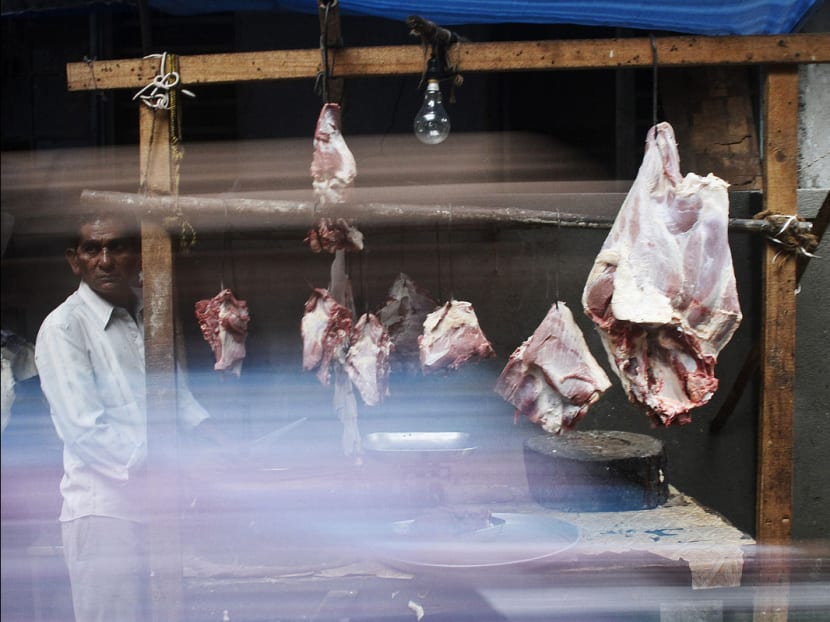In Mumbai, eating that steak could cost 5 years in jail
MUMBAI — A prime filet mignon at New York’s Old Homestead Steakhouse will set you back US$56. Wolfgang Puck’s Cut in London charges as much as US$210 for a ribeye. In Tokyo, a sirloin can top US$250.

A vendor sells beef at a roadside stall in Mumbai, in 2012. The government of the state of Maharashtra this week banned eating and slaughtering cows, steer and their byproducts. Photo: Bloomberg
MUMBAI — A prime filet mignon at New York’s Old Homestead Steakhouse will set you back US$56. Wolfgang Puck’s Cut in London charges as much as US$210 for a ribeye. In Tokyo, a sirloin can top US$250.
But nowhere is a juicy piece of beef as dear as in Mumbai, where it can now cost you five years in prison.
The government of the state of Maharashtra this week banned possession of beef and its byproducts and the slaughtering of cows, bulls and bullocks. The prohibition marks a victory for hardline Hindu groups that have sought to protect an animal their religion considers holy.
“This is not the sign of a maturing society,” said Mr Avinash Raheja, an angel investor and founder of Mumbai car-parking app Veh2Park who does not eat beef. “We claim to be the world’s biggest democracy, but does democracy apply only to the right to choose our electoral candidate?”
The hashtag #BeefBan became one of the most trending topics on Twitter, prompting scores of jokes and memes. The move risks appearing to enforce conservative Hindu principles on Muslim and Christian minorities in a nation of 1.2 billion, according to Mr Shiv Viswanathan, a professor at the O.P. Jindal Global University’s school of government and public policy near Delhi.
“The real battle of prohibition today will not be against alcohol, it will be against meat,” Mr Viswanathan said. “Many landlords won’t rent a house if you eat meat. That is also a way of throwing Muslims out.”
SECRET OFFERING
While beef or pork is taboo at many Indian eateries, including McDonald’s Corp. and Burger King outlets, some Mumbai restaurants do serve it and others offer it off the menu.
“If I show beef on the menu, lots of people may not enter,” said Mr P.K. Krishnan, who runs a restaurant specialising in south Indian-cuisine in the Mahim working-class neighborhood. Yet he sells as much as 12kg of beef daily, mostly in a spicy chili-fry dish popular in Kerala state.
In Imbiss, in the upscale Bandra neighborhood, owner Bruce Rodrigues caters to patrons who put up with a cramped room and air thick with the smell of bacon to tuck into 165 rupee (S$3.63) burgers and 265 rupee steaks. After the state’s chief minister announced the ban on Tuesday (March 3), his 10-table place was overwhelmed.
“There were people waiting outside, and that’s quite unusual for a Tuesday afternoon,” said Mr Rodrigues, who used to be a bank manager before opening the restaurant three years ago. “Some regulars came by asking if they can participate in a protest or something.”
BEEF SOUP
It’s not just steaks and hamburgers. Most of the cows’ offal — spleen, liver, kidneys and tongue — is sold to street vendors who mix it with soups and rice to sell to poor locals who can’t afford any other meat.
A bowl of chickpea soup mixed with a piece of grilled beef spleen sells for as little as 10 rupees, said Mr Sultan Shaikh, who been runs a sidewalk stall in the Mahim neighborhood. Most of the customers tend to be Muslims, he said.
“This is the cheapest source of protein,” said Mr Mohammad Ali Qureshi, president of the Bombay Suburban Beef Dealers Association. “For a poor man, one kilo of beef is enough to provide two meals for his family. All are looking at it from the religious angle and not the economic angle.”
In Mumbai alone, almost 100,000 people are involved in the beef and beef-product trade. An abattoir in the suburb of Deonar that slaughters about 400 bullocks and buffalo a day generates revenue of 250,000 rupees daily for the city government. Its operations were halted as of March 4, General Manager Apsing Pawara said.
At a busy eatery close to the Bandra commuter-train station, restaurant owner Maqeen Qureshi says that beef is the cheapest skewered meat he offers. An order of beef kebab at his bustling restaurant costs 60 rupees, whereas mutton costs 100 rupees and chicken costs 90 rupees.
“Every part of the animal — the skin, the organs, the meat, the blood — it all gets used for something or the other,” Ms Qureshi said. BLOOMBERG





